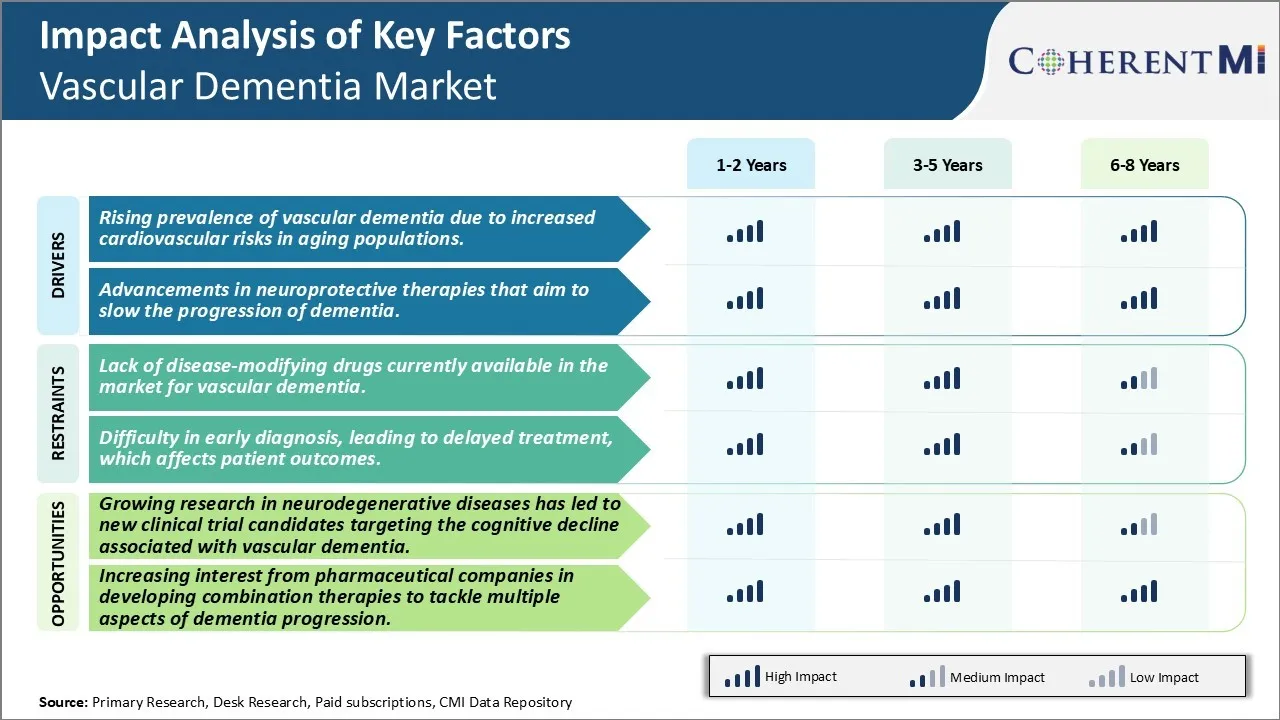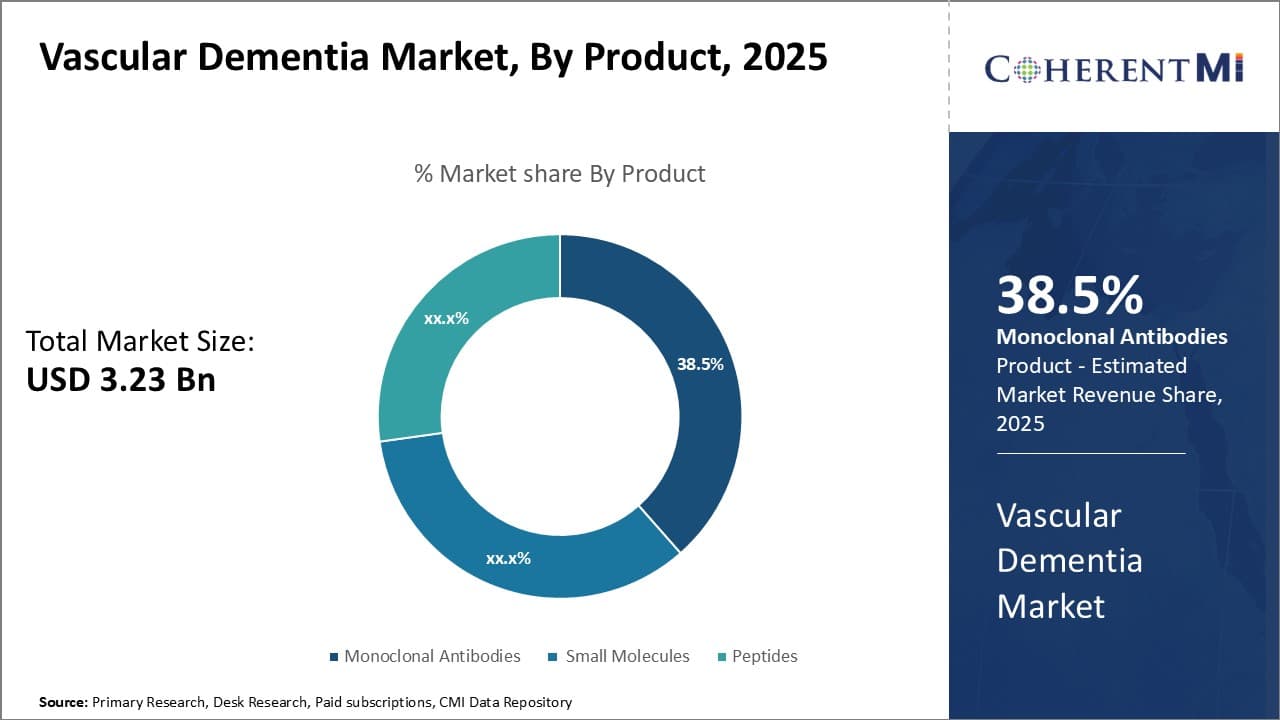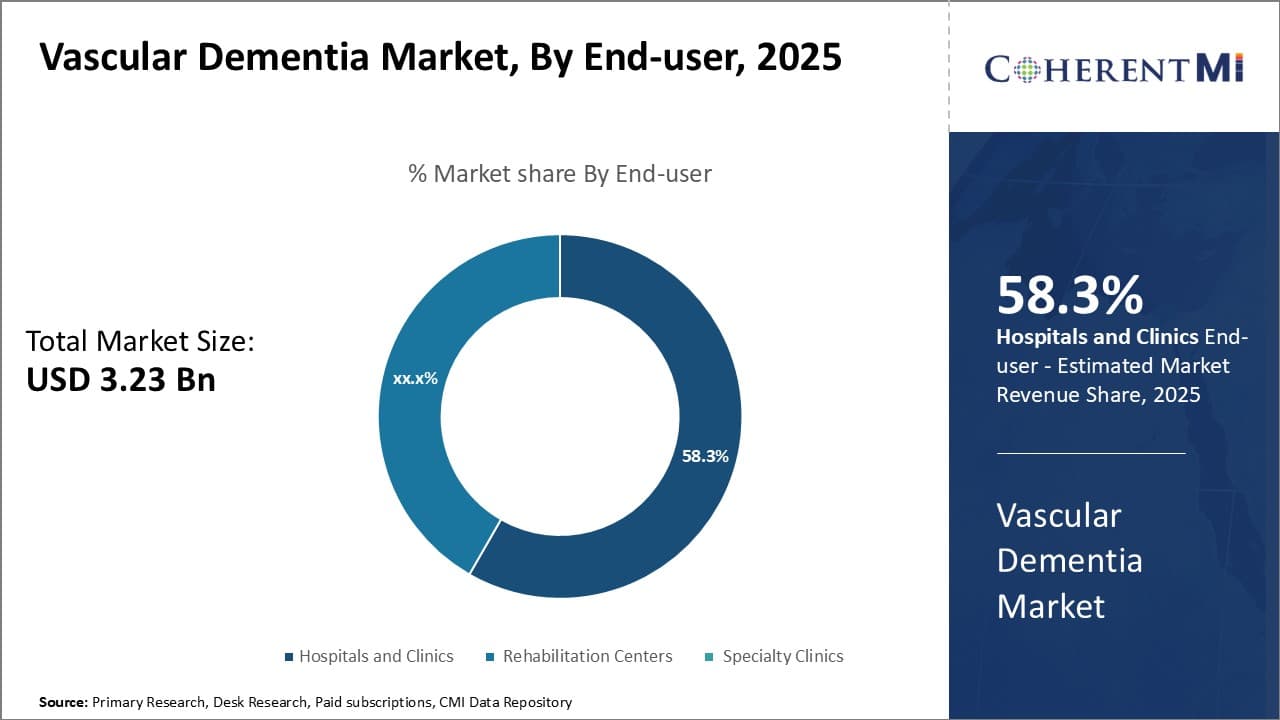

The Global Vascular Dementia Market is estimated to be valued at USD 3.23 Bn in 2025 and is expected to reach USD 4.34 Bn by 2032, growing at a compound annual growth rate (CAGR) of 4.3% from 2025 to 2032. Vascular dementia is a chronic and progressive condition caused by reduced blood flow to the brain damaging the brain cells. As the elderly population increases globally, the prevalence of vascular dementia is projected to rise exponentially in the coming years.
The vascular dementia market is driven by the growing geriatric population worldwide which is more susceptible to develop vascular dementia. Moreover, improving healthcare infrastructure and increasing healthcare spending in developing nations has also augmented the growth of the market. However, lack of approved treatment options and poor awareness regarding vascular dementia in developing regions pose a major challenge to the market. The market is experiencing growth driven by the increasing aging population and the rising prevalence of cardiovascular diseases, which are significant risk factors for the condition. Vascular dementia, characterized by cognitive decline due to impaired blood flow to the brain, often co-occurs with other neurodegenerative conditions like Alzheimer’s disease. Currently, there are limited treatment options, primarily focused on managing symptoms and addressing underlying cardiovascular issues. However, ongoing research and development in neuroprotective therapies, cognitive enhancers, and disease-modifying drugs are expected to create new opportunities in the market. Key players are actively pursuing innovative treatments, with clinical trials underway for promising candidates, highlighting the market's potential for growth and the urgent need for effective therapeutic solutions.
Market Size in USD Bn
CAGR4.3%
| Study Period | 2025-2032 |
| Base Year of Estimation | 2024 |
| CAGR | 4.3% |
| Market Concentration | Medium |
| Major Players | CSPC Ouyi Pharmaceutical, Aptinyx, Oryzon Genomics, Lundbeck, Novartis and Among Others |
Market Driver - Advancements in Neuroprotective Therapies that Aim to Slow the Progression of Dementia.
There is currently no cure for conditions like vascular dementia and Alzheimer’s disease which are the two most common types of dementia. However, research efforts into preventing or slowing down neural degeneration through neuroprotective therapeutics have gained significant momentum in recent years. One disease-modifying approach being widely explored is through drugs that can protect neurons from oxidative stress and reduce inflammation in the brain—two major drivers of neurodegeneration according to current scientific understanding.
Some clinical trials are under way to evaluate the efficacy of popular antidiabetic drugs like glucagon-like peptide 1 receptor agonists in improving cognitive functions by clearing amyloid plaques and enhancing neurogenesis. Several phase 3 studies are also testing cholesterol-lowering statins to determine if long term usage starting from early middle-age can delay onset or slow progress of dementia when used for primary prevention in those at high risk, rather than short term usage in late stages. Trials on repurposing other cardiovascular treatments like antihypertensives that can protect cerebral vessels from microhemorrhages are also ongoing.
Meanwhile, researchers are developing novel biological therapies and immunotherapies targeting amyloid and tau protein clumps implicated in neurodegeneration. Stem cell therapy and gene therapy hold future promise, although practical advances still remain few years away. With advancing diagnostic tests that can detect very early biological changes associated with cognitive decline, it may also become possible to identify individuals who could benefit most from early neuroprotective interventions even before noticeable symptoms appear. If proven successful, such disease-modifying drugs and therapies may significantly help delay the need for extensive medical supervision in dementia.
 To learn more about this report, Download Free Sample Copy
To learn more about this report, Download Free Sample Copy
Market Challenge - Lack of Disease-Modifying Drugs Currently Available in the Market for Vascular Dementia.
One of the major challenges faced in the vascular dementia market is the lack of effective disease-modifying treatments. Currently, there are no approved drugs that can slow or stop the progression of vascular dementia. The drugs available in the market are limited to only managing symptoms but do not address the underlying disease pathology. This leads to continuous cognitive decline in patients over time. Developing novel therapeutic approaches targeting the complex etiology of vascular dementia has proven difficult. The heterogeneous nature of vascular dementia, which can be caused by several different vascular brain injuries or lesions, poses a challenge for drug development. Demonstrating efficacy of potential disease-modifying drugs in clinical trials also requires longer trial periods and larger sample sizes due to the slow progression of the disease. The failure of many drug candidates in late-stage clinical trials further highlights the significant challenge in the market.
Market Opportunity: Growing Research in Neurodegenerative Diseases Has Led to New Clinical Trial Candidates Targeting the Cognitive Decline Associated with Vascular Dementia.
The increasing prevalence of vascular dementia and lack of effective treatment options have spurred more research activity targeting the disease. There is growing understanding of the molecular pathways involved in neurodegeneration and blood vessel damage leading to vascular dementia. This has enabled researchers to identify novel targets and develop new classes of drugs such as anti-inflammatory, anti-amyloid, and gene therapy approaches. Several pharmaceutical companies have started late-stage clinical trials evaluating disease-modifying drug candidates that aim to block specific disease mechanisms. Furthermore, advances in diagnostic testing allow earlier identification of patients in the mild cognitive impairment stage before irreversible damage occurs. This provides a longer window for potential treatment. If successful, these clinical programs can validate new therapeutic strategies and lead to the first approved disease-modifying drugs for vascular dementia in the coming years. This will capture a large unmet need and present major growth opportunities in the vascular dementia market.
Vascular dementia is typically treated through a staged approach based on disease progression. For mild cases in early stages, cholinesterase inhibitors are commonly prescribed. Donepezil (brand name Aricept) is often the first-line treatment due to its effectiveness and tolerability. Prescribers prefer donepezil for stabilizing cognitive function with fewer side effects versus galantamine (Razadyne) or rivastigmine (Exelon).
As the disease advances to a moderate stage, combination therapy may be considered to address multiple symptoms. A preferred option is to add memantine (Namenda), an NMDA receptor antagonist, to an ongoing cholinesterase inhibitor. This combination targets multiple pathways of cognitive decline. Prescribers note memantine provides benefits on attention, functioning and behavior when paired with donepezil.
For advanced cases with severe impairments, sympathomimetic drugs may be used judiciously to manage behavioral and psychological symptoms of dementia like agitation and psychosis. Prescribers are more inclined to try an antipsychotic like quetiapine (Seroquel) before haloperidol or risperidone due to their side effect profiles.
Other factors influencing prescribing preferences include treatment costs, availability of generic options, and patient comorbidities. Ease of administration also plays a role, as once-daily dosing of medications like memantine is preferable to multiple daily doses. Overall, prescribers seek to optimize current symptoms through an evidence-based approach tailored to the individual patient's disease stage and profile.
Vascular dementia has three main stages - mild, moderate, and severe - based on the level of impairment. For mild cases, lifestyle changes like exercise, diet control, and cognitive training are recommended. Additionally, treatments focus on managing risk factors.
For the moderate stage, drug therapies are considered. Antiplatelet medications like aspirin help prevent further blood clots and reduce risks of stroke. These are preferred first-line due to their effectiveness and minimal side effects. Statins such as atorvastatin and simvastatin are prescribed to lower cholesterol and reduce future vessel damage. For patients with a history of heart disease, medicines like ramipril aid vascular health.
Memantine and donepezil are the most commonly prescribed cholinesterase inhibitors. Donepezil under the brand Aricept is favored initially due to once-daily dosing improving compliance. It enhances acetylcholine levels in the brain for better cognition. However, memantine plus donepezil combination therapy is optimal if symptoms progress. The dual-mechanism drug Namzaric effectively blocks NMDA receptors while boosting acetylcholine levels for superior symptom relief.
In severe stages, non-pharmacological interventions become crucial. Structured activities, cognitive stimulation therapy, and physical rehabilitation help maximize remaining abilities and quality of life. Safety measures are prioritized as independence decreases. Hospitalization may be needed for aggressive symptom management and prevention of complications in late-stage patients.
Focus on Drug Development Targeting Vascular Risk Factors: Many leading pharmaceutical companies like Pfizer, Merck, and Eli Lilly have focused their R&D efforts on developing drugs that can effectively target modifiable vascular risk factors for vascular dementia like high blood pressure, diabetes, high cholesterol, and heart disease. For example, Pfizer's marketed hypertension drug Accuretic was shown to significantly reduce the risk of vascular dementia when taken for over 5 years in clinical trials conducted during 2010-2015. This helped increase Accuretic's market share in the antihypertensive segment.
Evaluate Repurposed Drugs: Some companies had success adopting the strategy of evaluating existing drugs for new vascular dementia indications. For example, Eli Lilly repurposed their Alzheimer's drug solanezumab for a vascular dementia trial during 2016-2020. Though the trial failed, it established solanezumab's safety profile in vascular pathology, positioning Lilly favorably should future trials succeed.
Target combination therapies: Given vascular dementia's multifaceted pathology, leading companies introduced combination therapies more recently. For example, Novartis' Phase 3 CANTAB trial during 2018-2022 evaluated a combination of their hypertension and cholesterol drugs for synergistic vascular dementia risk reduction. Though results are awaited, a positive outcome may give Novartis first-mover advantage in the combination space.
Focus on modifiable lifestyle factors: Some non-pharma players improved outcomes by targeting lifestyle-related vascular risk factors through programs. For instance, the Alzheimer's Society (UK) launched an extensive vascular risk reduction education campaign during 2010-2015 emphasizing exercise, diet, brain health etc. This strategy likely contributed to the UK witnessing a ~15% decline in predicted vascular dementia cases since 2015 according to a 2020 Lancet study.
 To learn more about this report, Download Free Sample Copy
Insights, By Product, Research on Monoclonal Antibodies Encourage Their Demand.
To learn more about this report, Download Free Sample Copy
Insights, By Product, Research on Monoclonal Antibodies Encourage Their Demand.
By Product, Monoclonal Antibodies contributes the highest share of the market owning to its targeted mechanism of action. Monoclonal antibodies have become the leading product segment within the vascular dementia market due to their targeted mechanism of action. These antibodies are designed to bind to specific proteins or receptors involved in the pathogenesis of vascular dementia, allowing them to intervene at the molecular level. Compared to other therapeutic options such as small molecules or peptides, monoclonal antibodies offer highly selective modulation of disease pathways.
The monoclonals currently dominating the market work by blocking proteins like TNF-α that contribute to neuroinflammation seen in vascular dementia. By damping excessive inflammatory responses in the brain, these antibodies can slow cognitive and functional decline. Their targeted approach minimizes off-target effects that could potentially harm healthy cells and tissues. Monoclonal antibodies also have long half-lives, only needing occasional intravenous dosing rather than daily pills. This improves patient adherence and clinical outcomes.
Furthermore, major pharmaceutical companies have invested heavily in developing novel antibody drugs tailored for different vascular dementia subtypes. Promising candidates in clinical trials target proteins like beta-amyloid, which accumulate abnormally in small vessel disease and mix vascular-Alzheimer's cases.
 To learn more about this report, Download Free Sample Copy
To learn more about this report, Download Free Sample Copy
Insights, By End-user, Hospitals and Clinics Contributes the Highest Share of the Market Due to Being the Primary Points of Diagnosis and Ongoing Management.
Among the end-user segments in the vascular dementia market, hospitals and clinics account for the largest share. This is because they serve as the principal points for diagnosing suspected cases of vascular cognitive impairment and dementia. Neurologists and geriatricians based in hospital outpatient departments or private clinics evaluate patients experiencing cognitive and functional changes. A variety of brain imaging techniques and cognitive/neuropsychological assessments are employed to distinguish a vascular etiology from other dementias. Once diagnosed, long-term monitoring and treatment also typically occurs in hospital clinics. Patients regularly visit for medication management, physiotherapy and occupational therapy, with clinicians tracking their response to interventions. Hospital programs additionally provide caregiver education and support resources.
Given the complexity of vascular dementia presentations and evolving risk factor control needs, specialized dementia clinics have proliferated within major hospital networks. These clinics take multidisciplinary team approaches involving vascular neurologists, neuropsychologists, neuroimaging experts and others. Their focus on complex cases consolidates local expertise and clinical research participation opportunities for newly diagnosed patients.
Vascular dementia is a complex neurocognitive disorder primarily driven by cardiovascular risk factors such as hypertension, diabetes, and atherosclerosis. Unlike other forms of dementia, such as Alzheimer’s disease, which is caused by neurodegenerative processes, vascular dementia is linked to cerebrovascular pathologies, leading to disruptions in cognitive function. The cognitive decline is typically more sudden and may be linked to strokes or other vascular events. Research into vascular dementia therapies has gained momentum in recent years, with several companies focusing on neuroprotective agents, cognitive enhancers, and anti-inflammatory treatments. However, despite advances in understanding the disease, there are still no disease-modifying treatments available, and most therapies are centered around managing symptoms and slowing disease progression. Companies like CSPC Ouyi Pharmaceutical, Aptinyx, and Oryzon Genomics are actively pursuing therapies that could change the landscape of vascular dementia treatment. With ongoing clinical trials for candidates like Butylphthalide and NYX-458, the future of vascular dementia treatment appears promising, although challenges remain in early diagnosis and treatment access.
The major players operating in the Vascular Dementia Market include CSPC Ouyi Pharmaceutical, Aptinyx, Oryzon Genomics, Lundbeck, Novartis, Araclon Biotech, TauRx Therapeutics, Avanir Pharmaceuticals, Janssen Pharmaceuticals, Neurimmune Therapeutics, Cognition Therapeutics and Sun Pharmaceuticals.
Would you like to explore the option of buying individual sections of this report?
Vipul Patil is a dynamic management consultant with 6 years of dedicated experience in the pharmaceutical industry. Known for his analytical acumen and strategic insight, Vipul has successfully partnered with pharmaceutical companies to enhance operational efficiency, cross broader expansion, and navigate the complexities of distribution in markets with high revenue potential.
Vascular Dementia Market is segmented By Product (Monoclonal Antibodies, Small Molecules), Peptides,...
Vascular Dementia Market
How Big is the Vascular Dementia Market?
The Global Vascular Dementia Market is estimated to be valued at USD 3.23 Bn in 2025 and is expected to reach USD 4.34 Bn by 2032.
What will be the CAGR of the Vascular Dementia Market?
The CAGR of the Vascular Dementia Market is projected to be 4.1% from 2024 to 2031.
What are the key factors hampering the growth of the Vascular Dementia Market?
The lack of disease-modifying drugs currently available in the market for vascular dementia and difficulty in early diagnosis, leading to delayed treatment, which affects patient outcomes. These are the major factors hampering the growth of the Vascular Dementia Market.
What are the major factors driving the Vascular Dementia Market growth?
The rising prevalence of vascular dementia due to increased cardiovascular risks in aging populations and advancements in neuroprotective therapies that aim to slow the progression of dementia. These are some major factors driving the Vascular Dementia Market.
Which is the leading Product in the Vascular Dementia Market?
The leading Product segment is Monoclonal Antibodies.
Which are the major players operating in the Vascular Dementia Market?
CSPC Ouyi Pharmaceutical, Aptinyx, Oryzon Genomics, Lundbeck, Novartis, Araclon Biotech, TauRx Therapeutics, Avanir Pharmaceuticals, Janssen Pharmaceuticals, Neurimmune Therapeutics, Cognition Therapeutics, Sun Pharmaceuticals are the major players.